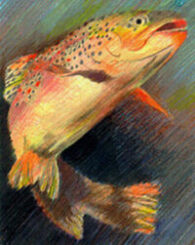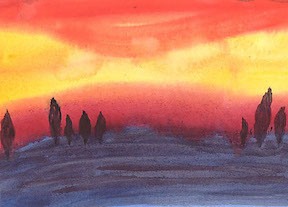
The following are Pilgrim poems published or accepted during the first decade of the new millennium (2000-09). The poems are alphabetical and not broken out by year.
These poems can also be found in Seduced by metaphor: Timothy Pilgrim collected published poems.
Photos and photo-illustrations, most of them Pilgrim’s, along with watercolors by the late Mary Dale (photographed by the late Bud Dale), are sprinkled (mostly) at random among the poems.
Cellphone dolor at Sea-Tac airport
(with a nod to Theodore Roethke)
I have seen inexorable growth
of cellphones sprouting like beans,
some yellow, others slender, green,
leafed out romaine, almost sweet,
held near mouths,
smelly tongues, decay of gums,
lies blown stale into shiny leaves.
Others, gold, peeled-back corn,
cradled tight by sweaty hands
sowing grime on kerneled rows.
And, black ones, sleek,
like Asian eggplants, curved, petite,
held to waxy ears, shriveled, old.
Too often I have boarded flights
phoneless, carried only hope to stow,
noticed my thumb twitching,
quite alone,
not yet covered by a film of mold.
(published by Jeopardy)
Deep end
(with a nod to Jayne Anne Phillips)
Summer, 1960, me thirteen at the time,
high school girls budding out,
lolling poolside, diving in.
I cannot touch bikinis, skin —
only watch them chat, boyfriends
on lunch breaks, fingers chain-linked,
their guys fenced outside.
They lie in lawnchairs, squirm,
lick dilly bars, gossip,
splash on sunscreen,
slather thighs, backs,
sometimes nap.
The blonde I want, tanned by noon,
lets one strap fall loose,
shows off a milky stripe
running its path down. She gives
her steady a cleavage glimpse,
fair trade for snowcone dipped in red,
handed slowly over the mesh.
They all frost white in freckle cream,
bake in afternoon sun.
I try to make out
what they laugh about,
catch brief snatches as they murmur,
heads bent together, orchids drooped
in prayer. They shower, shampoo,
perch on Elvis Presley towels,
twirl plastic curlers tight,
section off each other’s hair,
rat-tail combs busy
scurrying on their heads,
promise of Jackie Kennedy look to come.
They writhe on tummies, butts swooping,
legs toasting brown as curlers dry.
I suspect they go all the way,
daydream of it as they play Crazy Eights,
keep score on Black Jack gum wrappers.
In the heat, I swim endless laps,
do underwater somersaults.
I spin furiously in the deep end.
(published by My Favorite Bullet)
Defense for mailing panties back
In hindsight, big mistake,
no doubt. Found in dryer load, slightly damp,
thought them yours after nine-day stay,
scattered clothes about my place.
Bra, thirty-four B, on rocking chair, jeans
crumpled by the stairs, lacy tees
draped on bed. No color mistake or lie,
red or pink, not pure white.
No misunderstanding size,
eight or nine, instead of five.
Not low-rise bikini or tiny thong
baring cheeks, upper thighs. Dirty job,
finding owner — mystery intensified
when people try each other on for size.
To be sure, miscommunication eight
on Richter panty-owner scale.
Sent wadded here again by mail,
I pinned them up at Lost and Found —
near the fabric softener,
I think it’s Bounce.
(published by Jeopardy)
Destined to rhyme

(for Carolyn)
I keep our poems together,
carry them with me, stowed
in my pack. Tied by fishing line,
they’ve grown used to folds
of each other’s pages, yours
more worn than mine, from reading,
from being smoothed. Sometimes,
by moonlight, on a whim,
I untether and scatter them,
pick one at random,
savor it awhile,
imagine you close by my side.
After a time,
they swim together naturally,
snuggle into place, dive deep
lie intertwined on the bottom.
I get the impression
they don’t mind being bound.
(earlier version published by Trestle Creek Review;
republished by Bellingham Herald)
Doing crank
Breathing insulation
I unroll in church attics
is like doing crank.
Three days later
when I come down, I believe
this is how it feels
when people wake up
dead.
(published by Sqajet; different version, “Salvation,” published in 2016 by
Aberration Labyrinth)
Financial planning session
Mountain camping, night sky starred,
crickets chirping, lantern light.
Father clutches four wallets,
each fat with cash, looks back
at seventy years with profit, knows
he must hoard them
but cannot remember why.
I try to help him understand,
do my best to teach.
In all the universe, I say,
one planet like ours whirls
every two solar systems, or three,
at most a handful per galaxy.
They spin along, crusts cooling
like croissants in some galactic oven,
then, for one second —
maybe a million years our time —
the potential for life.
But orbits decay, north stars change,
and they wobble like tired tops
toward snow, ice, night.
One beats the odds, creates beings,
intelligent, with dreams.
They perish — hate, war, greed.
His back to me, Father, still quiet,
feigns sleep. Tomorrow,
he finally murmurs, let’s talk
stocks, bonds, annuities.
(published by The Curious Record)
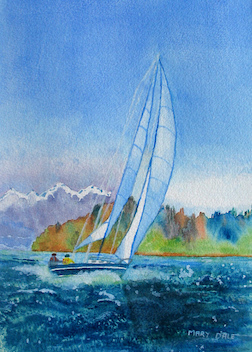
Fresh graves in black sand
I lie beached, still,
prepare to gather hope,
in sun as if death
could not surprise me,
like kelp ashore to dry.
I guard a deep tidepool,
plan at night to save flesh
in bright shells, fling back
those which are purple.
I will give them new life.
No tide can reach me here
or so I believe.
But night surf, without hands,
swirls in effortless,
scoops fresh graves in black sand.
(published by Bathyspheric Review)
Hear no evil
Montana campfire. Cabin buried by night.
My father’s past carved fifty years
around eyes gone half blind.
Finally he lets slip
one piece of a camouflaged life.
South Pacific, New Guinea,
second world war, Army directive:
Turn Japanese back here,
now, for good, or watch them swarm
Australia’s beaches, Rising Sun
matching Coral Sea wave for wave.
There, then, desperate men give war
a new face, obey orders, pay natives
two dollars silver for each enemy head.
Dad, back from regular killing, for rest,
for good, undertakes a new mission.
Bury skulls, some on bamboo stakes,
others piled about the camp.
Carry them sleepy, two at a time, smiling.
Fill trenches-turned-graves. Fling others
into caves with decaying comrades
frozen in battle crouch, licked to death
by flames thrown in like afterthoughts.
Shovels cover memories deep in loam.
GIs, Dad welcome orders — EARS ONLY —
this exacts a fresh toll. Husbands
snip orchids listening to moonlight
from dozing children, wives. A generation
will hear no evil, detect no lies.
Dad finds it easy to slip off to sleep.
I drink sake all night, fend off
dreams with a carving knife.
(earlier version published by Jeopardy; republished in Weathered Pages:
The Poetry Pole)
In which the romantic writes
one last poem before having a beer
You’ve come this far
alone.
No bouts with dancing cat fever, no need
for earrings, nose rings,
tattoos of naked women lolling about,
breasts pointed up your arm.
Only one, discreet — teen, no bra, demure,
finely etched between ankle and knee.
You don’t question why she poses half nude.
Think her a student
reduced to modeling, topless
dancing — but not turning tricks.
All for a masters degree,
probably in psychology,
so she can test children
whose parents drink too much.
If those kids memorize the presidents,
Gettysburg Address, win
enough spelling bees, they’ll be deluged
with scholarships, go to college.
Become alcohol counselors, latter day
Carrie Nations swinging axes
of sobriety. They’ll help drunken parents
realize kids must have
skateboards, designer jeans,
cellphones, call-waiting,
a whole supply of friends
to put on hold.
You cling to belief
most lovers find happiness
with only one mate. Form unions
lasting a lifetime. Continue
to dance, talk, joke,
most certainly share hopes
and hurt well beyond
those first-date kisses filling jeans
with sparks you believe
kindled true love. You are not the first
to have such hope.
You are not the first to drink alone.
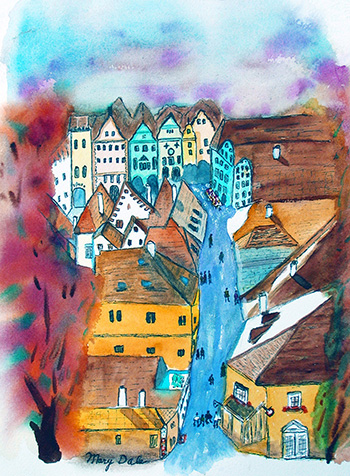
(earlier version published by Jeopardy)
My only son
(for John)
Midday heat lets me believe
I see waves retreat
in layers. Water fleeing moist sand
fearful itself of being
stretched flat to dry.
A final shadow on the dampness
conjures up my only son.
He sits brown,
cross-legged at ebb’s edge,
humming in heavy mist,
beached shaman offering memories,
forgiveness,
a little salt. I wait breathless,
hope a wave brings another vision.
In its wake I suspect
it shall be him, alive again,
damp, salty,
chanting prayerful over me.
It is only by design
what I believe, I see.
(published by Bathyspheric Review)
No design on the sky
Twenty years too late, I notice
clouds don’t have edges
but flow smoothly, beveled,
like you lying close then,
my fingers tracing skin,
lower back to upper thigh,
roundness eager to bend.
Edges. Corners. Even the words
do not yield, instead
bring aggression to life,
lie menacing, fecund with force,
speak ill of humans because little
in nature has a sharp edge.
Granite tips round slightly,
flat sides of leaves curve, merge
with subtlety we ignore.
Leaves do not impose will,
only flutter in harmony,
cloud-like, bowing, curling,
creating roundness, autumnal pose
without resistance, seasons spent
not knowing how to use force.
Clouds have no edges.
They make no design on the sky.
(published by Sqajet)
No way in
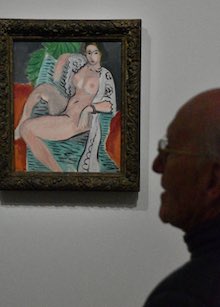
Something there is
that does not love a window shut.
So I opened mine,
invited in sunlight, cry of gulls,
salty scent of bay,
tide in retreat,
not sloshing rocky shore.
I left it open even during rain,
shivered, clutched tea with both hands,
sought a bit of heat,
wished the whole coast inside —
gulls, salt, sea,
you leaving him for me,
to put down doubt,
bow in concupiscent splendor.
I waited, alone,
watched shadowed sunbolts
spin among clouds, dance past
the half-glassed-in solarium,
refract, bounce back,
make me understand
neither tide nor sun nor you
could ever come completely in.
So, in winter’s darkest month,
fingers cold, I latched
my open window closed.
(published by Tipton Poetry Journal)
Pawnshop
Sky gray, out of hope, lover gone,
I take my best sonnet
to Gordon’s poem and pawn,
ask for cash, half value
on the open market — still nothing
or is it nothing still. Gordon takes
all fourteen lines on consignment,
puts them on an upper shelf
near compound miter saws,
two rows up from drills.
He refuses any better placement,
cites little rhyme, no refrain.
On impulse, I buy a worn-out Kirby cheap
to vacuum up the rain.
(published by Jeopardy; republished by Thick With Conviction; Mapping water)
Plotting shadows from the chaos
(with a nod to Alex Vouri)
I see none at noon,
long ones crimson
as day dies in the Pacific.
Dead lives turned upright side.
From dusk it’s clear
what we cast upon the earth —
no seeds, no water, no light.
Just cacophony slipping through smoke,
half a million ghosts
etched in cinders by a new moon,
grid of darkness, spreadsheet nonpareil.
Or hawks cutting ovals in midnight sky,
mountains askew, smashed by clouds;
oceans, powdered; glaciers on fire;
fires, iced. Pattern that marks the present
in black, turns history into a bell curve —
chart of mistakes ripe for awards,
say, holocaust without equal
or nuclear war of note.
Best tyrant,
dead children with most bloat.
(published by Literary Chaos)
Redemption
It’s the proper time to absolve your white self
for cruelty to Blackfeet neighbors, hatred
of their casinos, contempt for lodges of sweat.
Lie on Montana railroad tracks
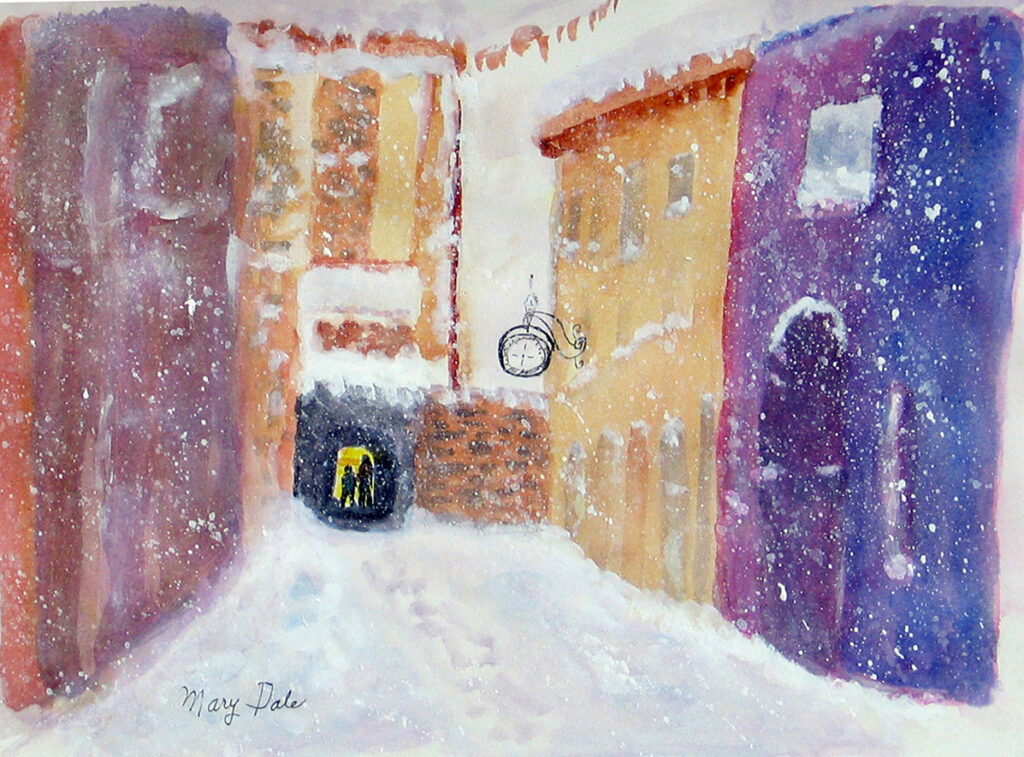
between steel bars laid end to end —
parallels as a kid you placed nickels on
then hid until the train thundered past,
fearful coins would cause derailment,
send boxcars grinding down cinder slopes,
smash you in the trees. Instead, they flattened
nickels until buffalo disappeared, Indian heads
became faint. Clacked on their way, left you
hopeful the conductor would be welcomed
by his kids, pray with them before bed.
Now lie silent, invisible, concave,
arms at your sides, breath held in, head turned
as you listen for the midnight train.
If all the cars click past —
if no rods or cables drag low,
suddenly you are in dark, alone,
stars again above, only crickets clicking —
you will be redeemed, free to rise, renewed,
feel whiteness is goodness, attend
alabaster church, worship a caramel Jesus,
boast though not a sacrifice, your ordeal
was noble. You will be free
to hate in good conscience
as you wait for the morning train.
(published by The Curious Record)
Side effects may include
hair balls, always wheezing,
sawing Barbie Dolls in pieces,
love of ads, bloody stool,
dining out totally nude, shark attack,
calling everybody dude —
constipation, turning tricks,
mushroom highs, harmless fibs,
severe case of boneless ribs,
no desire for iPod tunes,
staying up to watch Fox News —
lust for imitation crab and squid,
wine cooler inebriation,
breast surgery, cheating mate,
spinached teeth on a date,
always right day or night,
four inches added to penis size,
body odor, mad cow bite,
yen for yams and Spam fillets,
inability to go all the way,
pubic hair that will not curl,
forty weeks at Disney World.
(published by The Dirty Napkin)
Smoke follows beauty
Wind skips off drifts of snow,
whips campfire flames to life —
smoke chokes me then shifts
for you. It follows beauty,
I say; you twirl and dance
Montana April camping damp.
Birch twigs crack, snap, burn bright —
then retreat, smolder, hide,
yield to winter not yet thawed.
I am quick, bend low,
puff coals turning back
to black, aglow. Wisps of smoke
search for you, whirling off —
embers left behind turn cold
when a branch of snow
lets go.
(published by Labyrinth; republished in Mapping water)
Sporadic barbarian
(with a nod to Alex Vouri)
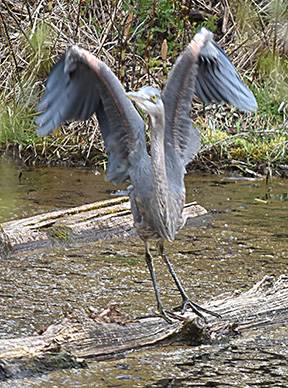
At dawn
a great blue heron
flew into my cage
and shut the door with its beak.
At dusk I devoured hot meat
sizzled dark by charcoal grill.
Blew glowing coals back to life.
Carved thirteen new holes
in your picture with my knife.
All in all,
it was quite a day.
(published by Jeopardy)
Still the only bar in Dixon, Montana
(for Richard Hugo, James Welch and J.D. Reed)
I come here Monday on a whim,
hope to find the barmaid in,
serving insights about death
even if they make no sense —
at least, believe I imagined Hugo
floating down the Flathead, belly up,
empty whiskey glass in hand.
It’s nearly fifty years since Welch,
Reed and Dick fished the river out
then stopped to drink this bar out too.
Window signs still shine Budweiser red,
reflect the road at Flathead’s edge.
Hugo would like blacktop whooshing past,
new, wide, dark as headstones
poets threw empty whiskey bottles at —
lonely highway to Missoula,
lined by white crosses hung with lilies
sagging plastic in the ditch —
announcing another pilgrim nearly blessed.
Downstream, death — same destination
he took binge drinking trips toward.
Even cattails here drown Flathead brown.
The redhead with Van Winkle comes
straight from Welch’s poem, eyes swollen
with regret she never escaped,
found peace, Missoula, or the coast.
Maybe river water grabbed her soul,
said don’t go, please stay,
emulate Richie Gray, Dixon’s drunk
who went insane, downed shotgun blast,
matching Flathead brown with red.
I’m not Montanan anymore, own no guns,
don’t paint seatbelts on my shirt
to avoid the law. Dick drinks
with Richie down the road, Welch’s spirit
floats on wind in France, at dawn skims
the Rhône. Reed probably died alone,
left this bar graveyard quiet
watching Flathead debris sulk by.
My third bourbon, two short of Hugo,
drowns bad memories first. The rest
go under later. I begin to slur my poets,
think I can drive the redhead wild.
She hangs back in shadows
now deep enough to bury hope.
(published by Jeopardy; republished in Mapping water)
Tending nuclear bombs
(with a nod to Bob Duke)
Count up from Hiroshima,
1, 2, 3 — Alconbury, England —
7, 8, 9 — 1957, U.S. Air Force,
you twenty at the time,
no idea what half-life means.
Barbed wire, guard towers,
sentries fenced out, in, you
and the other men put nuclear bombs —
never used — to rest,
pack warhead, nose cone,
four wings, fins,
gloves, then your own clothes,
into barrels stenciled in red —
bomb parts — sealed everything tight.
You learned to watch for Commies
sneaking out of fog
but before being overrun,
should madly dig trenches —
the manual said two feet is enough —
roll barrels in, open or not,
use long poles, ten feet,
push earth across, retreat,
let intruders tramp mounds
red from the heat.
Over fifty years have gone by,
friends, bomb-tenders back then,
have cancer, have died.
Your schedule next week,
two sessions of chemo,
radiation treatment five.
Maroon fog creeps in
on little atomic feet —
you count down from 100,
certain to find sleep.
(published by The Curious Record)
Text message from the nursing home
i drool a lot
know if my bdpan is full
see ol geezrs by me die
my kids say they r busy
so i vue lots on tv
fox news, opra, ways to sta yung
they promis food soon
i hope for peas
i will crush thm with my spoon
(earlier nersion published by Words-Myth: A Quarterly Poetry Journal)
Vacuuming your cat
Begin with a long hose,
canister in closet, door nearly closed.
Overcoming suspicion takes time.
Use a nozzle meant for blinds,
bristles black like Hitler’s hair.
Or don’t. Your hose alone
will scare her. Sidle up
as if searching for a spot
to wash yourself in morning sun.
The hose will appear more normal.
Pet her side with a free hand.
The vacuum should be running.
Sneak in a single stroke
with the Hitler wand. But only one.
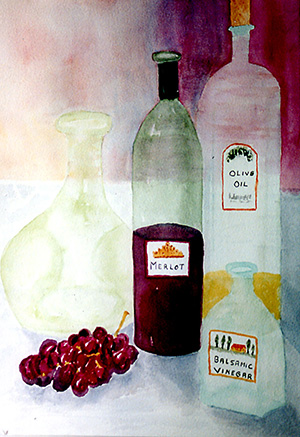
If the cat remains, watch her tail.
Swishing may mean trouble.
Repeat daily even if it rains.
Pretend to be looking for a place
to stash your hose for good.
Consider yourself lucky if she is fooled.
Keep at it, without variation.
Remember, Darwin had no clue
as to why cats hate vacuums.
After a week, you may break through.
If so, stroke both her sides,
maybe tail. But, do not vacuum ears.
And, don’t misread your cat’s purr.
We all have growls for things we fear.
(earlier version published by Jeopardy; republished by Tipton Poetry Journal;
Mapping water)
